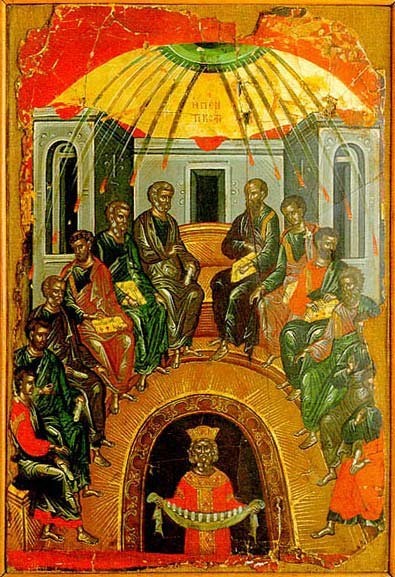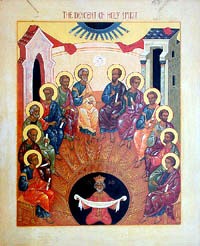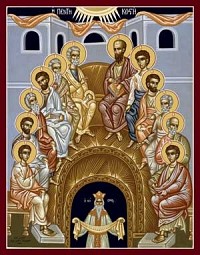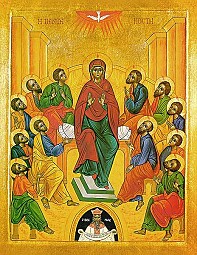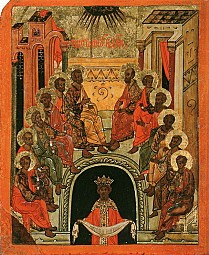PENTECOST 2024
Saturday, June 22:
- 6:00pm - Festal Vespers with Litya
Sunday, June 23:
- 9:10am - Hours
- 9:30am - Divine Liturgy
- followed by Vespers of Pentecost with 'Kneeling Prayers'
Monday, June 24 - Day of the Holy Spirit (Patronal Feast of our Parish)
- 9:30am - Divine Liturgy
Wednesday, June 26 - Afterfeast of Pentecost:
- 7:30pm - Bible Study
Friday, June 28 - Afterfeast of Pentecost
- 7:00pm - Great Vespers w/Litiya
Saturday, June 29 - Holy Apostles Peter & Paul
- 9:30am - Divine Liturgy
- 6:00pm - Great Vespers
Sunday, June 30 - Sunday of All Saints
- 9:10am - Hours & Divine Liturgy
Read Fr Steven's Meditation, Pentecost, the Fulfillment of Pascha.
THE GREAT FEAST
of PENTECOST
THE DESCENT OF THE HOLY SPIRIT, THE FEAST OF THE HOLY TRINITY — The disciples receive the power from on high, and the age of the Church begins.
On the last day, that great day of the feast, Jesus stood and cried out, saying, "If anyone thirsts, let him come to Me and drink. He who believes in Me, as the Scripture has said, out of his heart will flow rivers of living water. But this He spoke concerning the Spirit, whom those believing in Him would receive... (JN 7:37-39)
Scroll down for two very helpful, explanatory articles on this Great Feast, by Fr Alexander Schmemann and Fr Thomas Hopko. Immediately below are links for further reading.
on Pentecost and the Holy Spirit,
from the Myriobiblos online library
- St Basil the Great - On The Holy Spirit
- St Gregory the Theologian - On Pentecost
- St Photios the Great - Mystagogy of the Holy Spirit
- On Pentecost by St. Gregory Palamas
- Is Pentecost the Birthday of the Church? - from the Pentecostarion
- From the Sacred Ascension To Holy Pentecost
- The Confusion of Babel and the Unity of Pentecost
- That We Ought Not To Grieve the Spirit of God
- Babylon and the Trees of Pentecost
- Monday of the Holy Spirit
- The Attributes of the Church - St Justin Popovich
- Every Mystery and Every Virtue Is A Small Pentecost - St Justin Popovich
|
Troparion - Tone 8 Blessed art Thou O Christ Our God, Who hast revealed the fishermen as most wise! By sending down upon them the Holy Spirit, Through them Thou didst draw the world into Thy net; O Lover of Man, Glory to Thee! |
Kontakion - Tone 8
When the most High came down and confused the tongues, He divided the nations; But when he distributed the tongues of fire He called all to unity. Therefore, with one voice, we glorify the All-holy Spirit! |
In the new covenant of the Messiah, the passover event takes on its new meaning as the celebration of Christ’s death and resurrection, the “exodus” of men from this sinful world to the Kingdom of God. And in the New Testament as well, the pentecostal feast is fulfilled and made new by the coming of the “new law,” the descent of the Holy Spirit upon the disciples of Christ.
The Holy Spirit that Christ had promised to his disciples came on the day of Pentecost (Jn 14:26, 15:26; Lk 24:49; Acts 1:5). The apostles received “the power from on high,” and they began to preach and bear witness to Jesus as the risen Christ, the King and the Lord. This moment has traditionally been called the birthday of the Church.
In the liturgical services of the feast of Pentecost, the coming of the Holy Spirit is celebrated together with the full revelation of the divine Trinity: Father, Son, and Holy Spirit. The fulness of the Godhead is manifested with the Spirit’s coming to man, and the Church hymns celebrate this manifestation as the final act of God’s self-disclosure and self-donation to the world of His creation. For this reason Pentecost Sunday is also called Trinity Day in the Orthodox tradition. Often on this day the icon of the Holy Trinity—particularly that of the three angelic figures who appeared to Abraham, the forefather of the Christian faith - is placed in the center of the church. This icon is used with the traditional pentecostal icon which shows the tongues of fire hovering over Mary and the Twelve Apostles, the original prototype of the Church, who are themselves sitting in unity surrounding a symbolic image of “cosmos,” the world.
On Pentecost we have the final fulfillment of the mission of Jesus Christ and the first beginning of the messianic age of the Kingdom of God mystically present in this world in the Church of the Messiah. For this reason the fiftieth day stands as the beginning of the era which is beyond the limitations of this world, fifty being that number which stands for eternal and heavenly fulfillment in Jewish and Christian mystical piety: seven times seven, plus one.
Thus, Pentecost is called an apocalyptic day, which means the day of final revelation. It is also called an eschatological day, which means the day of the final and perfect end (in Greek eschaton means the end). For when the Messiah comes and the Lord’s Day is at hand, the “last days” are inaugurated in which “God declares:... I will pour out my Spirit upon all flesh.” This is the ancient prophecy to which the Apostle Peter refers in the first sermon of the Christian Church which was preached on the first Sunday of Pentecost (Acts 2: 1 7; Joel 2: 28-32).
Once again it must be noted that the feast of Pentecost is not simply the celebration of an event which took place centuries ago. It is the celebration of what must happen and does happen to us in the Church today. We all have died and risen with the Messiah-King, and we all have received his Most Holy Spirit. We are the “temples of the Holy Spirit.” God’s Spirit dwells in us (Rom 8; 1 Cor 2-3, 12; 2 Cor 3; Gal 5; Eph 2-3). We, by our own membership in the Church, have received “the seal of the gift of the Holy Spirit” in the sacrament of chrismation. Pentecost has happened to us.
The Divine Liturgy of Pentecost recalls our baptism into Christ with the verse from Galatians again replacing the Thrice-Holy Hymn. Special verses from the psalms also replace the usual antiphonal psalms of the liturgy. The epistle and gospel readings tell of the Spirit’s coming to men. The kontakion sings of the reversal of Babel as God unites the nations into the unity of his Spirit. The troparion proclaims the gathering of the whole universe into God’s net through the work of the inspired apostles. The hymns 0 Heavenly King and We have seen the True Light are sung for the first time since Easter, calling the Holy Spirit to “come and abide in us”, and proclaiming that “we have received the heavenly Spirit.” The church building is decorated with flowers and the green leaves of the summer to show that God’s divine Breath comes to renew all creation as the “life creating Spirit.” In Hebrew the word for Spirit, breath and wind is the same word, ruah.
who hast revealed the fishermen as most wise
by sending down upon them the Holy Spirit:
through them Thou didst draw the world into Thy net.
O Lover of Man, Glory to Thee (Troparion).
When the Most High came down and confused the tongues,
he divided the nations. But when he distributed the tongues of fire,
he called all to unity. Therefore, with one voice,
we glorify the All-Holy Spirit! (Kontakion)
The Great Vespers of Pentecost evening features three long prayers at which the faithful kneel for the first time since Easter. The Monday after Pentecost is the feast of the Holy Spirit in the Orthodox Church, and the Sunday after Pentecost is the feast of All Saints. This is the logical liturgical sequence since the coming of the Holy Spirit is fulfilled in men by their becoming saints, and this is the very purpose of the creation and salvation of the world. “Thus says the Lord: Consecrate yourselves therefore, and be holy, for I your God am holy” (Lev 11:44-45, 1 Pet 1:15-16).
Source: OCA website.
THE VIGIL OF PENTECOST
"Let us celebrate Pentecost, the coming of the Holy Spirit, The appointed day of promise, and the fulfillment of hope, The mystery which is as great as it is precious."
In the coming of the Spirit, the very essence of the Church is revealed:
"The Holy Spirit provides all, Overflows with prophecy, fulfills the priesthood, Has taught wisdom to illiterates, has revealed fishermen as theologians, He brings together the whole council of the Church."
In the three readings of the Old Testament (Numbers 11:16-17, 24-29; Joel 2:23-32; Ezekiel 36:24-28) we hear the prophecies concerning the Holy Spirit. We are taught that the entire history of mankind was directed towards the day on which God "would pour out His Spirit upon all flesh." This day has come! All hope, all promises, all expectations have been fulfilled. At the end of the Aposticha hymns, for the first time since Easter, we sing the hymn: "O Heavenly King, the Comforter, the Spirit of Truth…," the one with which we inaugurate all our services, all prayers, which is, as it were, the life-breath of the Church, and whose coming to us, whose "descent" upon us in this festal Vigil, is indeed the very experience of the Holy Spirit "coming and abiding in us."
Having reached its climax, the Vigil continues as an explosion of joy and light for "verily the light of the Comforter has come and illumined the world." In the Gospel reading (John 20:19-23) the feast is interpreted to us as the feast of the Church, of her divine nature, power and authority. The Lord sends His disciples into the world, as He Himself was sent by His Father. Later, in the antiphons of the Liturgy, we proclaim the universality of the apostles' preaching, the cosmical significance of the feast, the sanctification of the whole world, the true manifestation of God's Kingdom.
The liturgical peculiarity of Pentecost is a very special Vespers of the day itself. Usually this service follows immediately the Divine Liturgy, is "added" to it as its own fulfillment. The service begins as a solemn "summing up" of the entire celebration, as its liturgical synthesis. We hold flowers in our hands symbolizing the joy of the eternal spring, inaugurated by the coming of the Holy Spirit. After the festal Entrance, this joy reaches its climax in the singing of the Great Prokeimenon:
"Who is so great a God as our God?"
Then, having reached this climax, we are invited to kneel. This is our first kneeling since Easter. It signifies that after these fifty days of Paschal joy and fulness, of experiencing the Kingdom of God, the Church now is about to begin her pilgrimage through time and history. It is evening again, and the night approaches, during which temptations and failures await us, when, more than anything else, we need Divine help, that presence and power of the Holy Spirit, who has already revealed to us the joyful End, who now will help us in our effort towards fulfillment and salvation.
All this is revealed in the three prayers which the celebrant reads now as we all kneel and listen to him. In the first prayer, we bring to God our repentance, our increased appeal for forgiveness of sins, the first condition for entering into the Kingdom of God.
In the second prayer, we ask the Holy Spirit to help us, to teach us to pray and to follow the true path in the dark and difficult night of our earthly existence. Finally, in the third prayer, we remember all those who have achieved their earthly journey, but who are united with us in the eternal God of Love.
The joy of Easter has been completed and we again have to wait for the dawn of the Eternal Day. Yet, knowing our weakness, humbling ourselves by kneeling, we also know the joy and the power of the Holy Spirit who has come. We know that God is with us, that in Him is our victory.
Thus is completed the feast of Pentecost and we enter "the ordinary time" of the year. Yet, every Sunday now will be called "after Pentecost" - and this means that it is from the power and light of these fifty days that we shall receive our own power, the Divine help in our daily struggle. At Pentecost we decorate our churches with flowers and green branches - for the Church "never grows old, but is always young." It is an evergreen, ever-living Tree of grace and life, of joy and comfort. For the Holy Spirit - "the Treasury of Blessings and Giver of Life - comes and abides in us, and cleanses us from all impurity," and fills our life with meaning, love, faith and hope.
Father Alexander Schmemann (1974)


